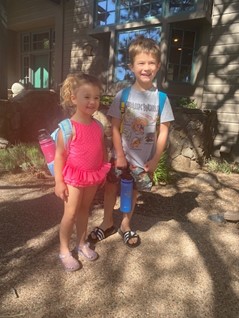We’re not the biggest gift giving household on the block, but my wife keeps asking me what I want for Father’s Day and I haven’t been able to give her a concrete answer. It could be because I’ve been focusing on a bigger idea lately, mindfulness. Like most things these days, my kids are the reason why I’ve been thinking about it. We just celebrated my daughter’s half birthday, you can chalk one up to dad’s mindfulness for remembering she was turning 3 ½; my son is already coming up on his sixth birthday! Ok, so I’ve been focusing on a mix of big and small things, but do I actually need anything for Father’s Day? Probably not.

I’m sad to say all the clichés are true about raising children; they change your life, a child’s love is like no other, blah, blah, blah, etc. I’m not a super sentimental guy—or at least I wasn’t—so it’s tough to realize all those sappy photo frames at Target were telling the truth this whole time. Nevertheless, I can’t get this concept of mindfulness out of my head.
With my kids, mindfulness is about being in the moment and actually considering what I’m doing. It’s too easy to be distracted by my phone, the TV (go Suns!), or a chore I’m putting off instead of just focusing, so I have to be thoughtful about my time with them. Those of you who also have children know this is a much taller task than it may appear—you can only read them Piggy Paints or play “animals” so many times before your mind starts to wander. You don’t have to have children though, to see the battle between mindlessness and mindfulness infiltrating all aspects of our life.
An Exercise in Mindfulness
Here’s an experiment you can do to remind you how mindless we are a lot of the time: next time you are driving, try and focus solely on the act of driving the car and see how long you last. No radio, no podcast, no phone call. Turn the key, put the car in reverse, feel the steering wheel and try and not let your mind wander off the task at hand. I think I almost made it out of my driveway before I started thinking about something else which was sadly longer than I thought I’d make it. Driving is an extremely complicated task when you break it down, and yet it’s very challenging to focus solely on it.
Have you ever introduced yourself to someone and completely missed their name even though you were staring right at them? Maybe you were focusing too hard on getting the proper handshake (remember those?) or saying your own name correctly, but it happens. My wife will also happily testify that there are times when I ask her a question and have zoned out before she even starts saying the answer (sorry, honey).
There are obvious biological reasons for this. Your brain only has so much energy throughout the day and doesn’t need to waste it on menial tasks. I can attest how draining total focus can be. I have a job that requires little physical exertion, but I’m exhausted after an initial client meeting where my only job is to ask questions and listen intently to the person sitting across from me. Of course, doing my job well is a great use of my brain’s energy. The problem is when mindlessness infiltrates these areas that require more attention than we give them—like our finances, for example.
Your Finances and Mindfulness
You may not think about each purchase at the grocery store or give a second thought to your cable bill each month, and, in fact, many of you are in a position where you don’t have to think about every dollar spent. Simply because you don’t have to think about it doesn’t mean you shouldn’t. Especially as we come out of the last 15 months and get back to some sense of normalcy, some intentionality and mindfulness can go a long way.
One piece of advice: if the answer to the question, “why are we spending dollars on _____?” is “because we have to” or “because we need it,” you need to think harder about your answer. It’s highly unlikely you need most of the things you are spending money on. You may value something tremendously or have a strong desire for something which is great, but that’s different than needing it. I urge you to take a week or a month and really think about how and why you’re spending your resources the way you are.
It’s easy to forget that everything we spend money, time, or energy on is a choice. Be mindful about these things and consider each choice for what it is instead of mindlessly going through the motions.


